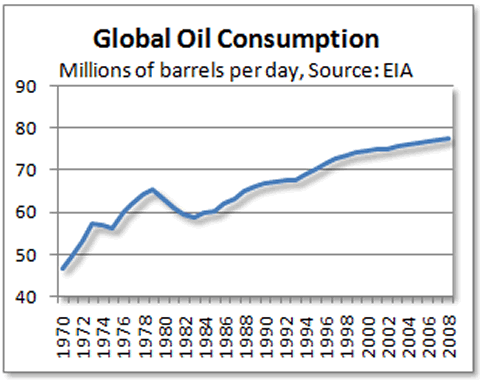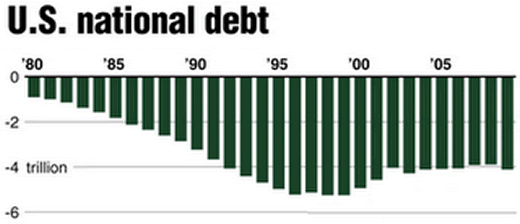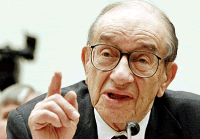Alternative Financial Market and Economic Headlines for 2009
Stock-Markets / Financial Markets 2009 Sep 19, 2009 - 06:52 AM GMTBy: Tim_Iacono
 Now a year removed from the Lehman Brothers failure and as memories of the tumultuous events of late-2008 and early-2009 begin to fade, an eerie complacency settling in over financial markets that millions of investors hope does not portend a storm to come, in order to gain more perspective on what exactly has transpired over the course of the last year or two - and over the last decade or two - it seemed like a good idea to reflect on how things could have been this year if, years ago, many decisions had been made very differently.
Now a year removed from the Lehman Brothers failure and as memories of the tumultuous events of late-2008 and early-2009 begin to fade, an eerie complacency settling in over financial markets that millions of investors hope does not portend a storm to come, in order to gain more perspective on what exactly has transpired over the course of the last year or two - and over the last decade or two - it seemed like a good idea to reflect on how things could have been this year if, years ago, many decisions had been made very differently.
That is, how the world might be different here in 2009 if the events of the last two years could have somehow been avoided, with headlines and stories such as the ones below appearing in the news instead of the ones we've been reading.
Home Prices Rise Modestly - NAR Lobbies for "Flexible" Loans
 The National Association of Realtors reported that home price rose 0.3 percent last month, up 3.6 percent from year ago levels, as the realtors' trade group announced they've joined forces with homebuilders and mortgage lenders in calling on federal agencies to relax lending standards to allow more Americans to own their own home.
The National Association of Realtors reported that home price rose 0.3 percent last month, up 3.6 percent from year ago levels, as the realtors' trade group announced they've joined forces with homebuilders and mortgage lenders in calling on federal agencies to relax lending standards to allow more Americans to own their own home.
"The home ownership rate has been stuck at 65 percent for the last forty years and it's time we improved on that", said the trade group's chief economist David Lereah. "Many in the real estate industry think the time has come to expand on that base by offering new and innovative loan products to two key groups of potential home buyers - those with bad credit and those with little or no money for downpayments."
For years, most economists and lawmakers in Washington have warned that greatly relaxing lending standards could fuel run-away home prices that, at first, might be a boon for the U.S. economy but, would ultimately end in tears. So far, this wisdom has prevailed...
Personal Spending Up 0.3% in July, Savings Rate Stable at 11%
 Despite efforts by the banking industry to make credit more widely available and compel Americans to borrow more, the Federal Reserve continues to restrict credit creation and consumers remain generally averse to living over-indebted lifestyles, striking a balance between spending and saving.
Despite efforts by the banking industry to make credit more widely available and compel Americans to borrow more, the Federal Reserve continues to restrict credit creation and consumers remain generally averse to living over-indebted lifestyles, striking a balance between spending and saving.
While personal consumption rose 0.3 percent last month, up 3.6 percent on a year-over-year basis, the personal savings rate (after tax income less spending) was unchanged at an even 11.0 percent, seemingly stuck in the same 8 to 12 percent range that has persisted for decades.
A growing number of economists think the savings rate should be lower, arguing that it will boost economic growth that has been lackluster, yet remarkably stable, in recent years. "Personal consumption as a percent of GDP has been 62 percent, plus or minus a percentage point or two for far too long", said Joe Cavandish, a Merrill Lynch economist. "It should account for at least 70 percent of the output in an advanced economy such as ours".
It is unlikely that policymakers will make any substantive changes to an approach that has worked so well for so long, but that won't stop the banking industry from trying to encourage Americans to borrow and spend more...
Rating Agencies "Uncooperative" in Rating New Loan Products
 The stalemate continues between major Wall Street investment firms and the three major rating agencies - Standard & Poor's, Moody's, and Fitch - regarding new classes of innovative financial products. The Securities and Exchange Commission has, once again, been required to mediate these increasingly heated negotiations and, as expected, has again, sided with the rating agencies in their judgment to deny triple-A ratings for these products.
The stalemate continues between major Wall Street investment firms and the three major rating agencies - Standard & Poor's, Moody's, and Fitch - regarding new classes of innovative financial products. The Securities and Exchange Commission has, once again, been required to mediate these increasingly heated negotiations and, as expected, has again, sided with the rating agencies in their judgment to deny triple-A ratings for these products.
"We just don't know how these securities will do in a down market and we have to err on the side of caution", commented George Buckey at Moody's. "After all, that's what we're being paid for - we'd be doing our customers a disservice if we did not properly assess the risk involved."
For years, institutional investors have been clamoring for fixed income investments with higher yields, prodding Wall Street firms such as Lehman Brothers for more choices. With mandates to buy only triple-A rated debt and with the rating agencies not willing to look favorably upon this new class of financial products, it appears that the options will remain limited for this large group of investors for some time to come...
Internet Industry Grows, Still Hampered by Fed
 Following in his predecessor's footsteps, Fed chairman Ben Bernanke has stymied Silicon Valley entrepreneurs once again by using the central bank's "bully pulpit" and its influence in credit markets to "nip in the bud" another internet stock market bubble in the making.
Following in his predecessor's footsteps, Fed chairman Ben Bernanke has stymied Silicon Valley entrepreneurs once again by using the central bank's "bully pulpit" and its influence in credit markets to "nip in the bud" another internet stock market bubble in the making.
The "internet age" has proceeded in fits and starts since the mid-1990s when, for a brief period of time, share prices for internet stocks rose rapidly. Due to what is now known as "targeted tight credit" for the growing industry and persistent fears by the central bank of a repeat of the mid-1990's period of "irrational exuberance", this sector is likely to see only limited growth for the foreseeable future.
The industry has produced grand new technologies and created hundreds of thousands of jobs over the last fifteen years, however, many feel that the technology boom is being held back by the Federal Reserve, first under chairman Alan Greenspan and now with Ben Bernanke as Fed chief.
When questioned on the subject recently, Bernanke noted, "The Federal Reserve will not allow asset bubbles to form in this economy. While some continue to think that the central bank can just 'mop up' after these bubbles burst, that is not a view that is shared by the Fed"...
Commodity SuperCycle Now Expected to Begin in 2015
OPEC officials met in Riyadh, Saudi Arabia yesterday and complained loudly to the assembled international press corps about measures taken by policymakers in the West over the years that have restricted economic growth and led to little new demand for crude oil.
 After China emerged as an important new force in the global economy in the mid-1990s, there were widespread fears that global energy demand would soon outstrip world-wide production capacity. Much to the chagrin of the oil cartel, those fears have been soundly laid to rest as both energy demand and oil prices have been remarkably stable for more than a decade.
After China emerged as an important new force in the global economy in the mid-1990s, there were widespread fears that global energy demand would soon outstrip world-wide production capacity. Much to the chagrin of the oil cartel, those fears have been soundly laid to rest as both energy demand and oil prices have been remarkably stable for more than a decade.
Those predicting that the "commodity super-cycle" would push prices for natural resources much higher earlier in the decade now estimate that this supply/demand imbalance will not emerge for at least another five years, largely due to deft policy initiatives, particularly in the U.S. where government programs to encourage the development of alternative energy and reduce consumption of fossil fuels have forestalled what many viewed as a looming "energy crisis" less than a decade ago.
Elsewhere in the commodities sector, the price of gold continued its recent surge, rising from $385 an ounce to $392 an ounce, a new 23-year high...
National Debt at $4 Trillion Still "Way Too High"
The Obama administration reported that there will be no Federal budget surplus this year, dashing hopes that the U.S. government could post three consecutive years of whittling down its massive debt that is now expected to surpass $4 trillion for the first time since 2006.

Some fear that without the fiscal prudence that began during the Clinton administration and carried on for two terms under George W. Bush, the nation will see a return to annual deficits in the hundreds of billions of dollars with the national debt again exceeding $5 trillion.
The American public is not likely to soon give up those hard fought gains, coming largely through the Medicare and Social Security reforms of 1997 and drastically reduced military expenditures earlier in the decade, and rising deficits may once again cause voters to drastically reshape Congress as they did in 1996.
The experience of the last ten years has finally laid to rest the notion that high levels of government spending during economic downturns is the most effective way to manage business cycles in a large economy. The short and painful recession of 1998, where the government stood aside only to see thousands of banks fail and the unemployment rate surge to 18 percent, was followed by a remarkably vibrant recovery the following year and has caused many economic textbooks to be rewritten...
The Greenspan Legacy Grows
 Like his predecessor, Paul Volcker, the legacy of former Fed chairman Alan Greenspan continues to grow as current central bank chief Ben Bernanke, now entering his fourth year in charge, struggles to keep the Federal Reserve relevant.
Like his predecessor, Paul Volcker, the legacy of former Fed chairman Alan Greenspan continues to grow as current central bank chief Ben Bernanke, now entering his fourth year in charge, struggles to keep the Federal Reserve relevant.
In a lightly attended question and answer session following a speech yesterday at the Economics Club of New York, Bernanke said, "Yes, my first term has been remarkably successful and I have former Fed chairman Alan Greenspan to thank. I feel like I've not even come close to filling his shoes".
Many analysts say that crackdowns by Greenspan on hedge funds and other Wall Street firms and "nipping in the bud" the nascent "shadow banking system" in the late-1990s and growing use of "derivatives" a few years later have fostered years of steady growth, moderately rising asset prices, and economic stability that some now call "boring".
After witnessing the early-1990s destructive aftermath of the bursting of the stock market and property bubbles in Japan, Greenspan popularized the term "nip it in the bud" early on in his 18 year term at the Fed. Though unpopular during his tenure and termed "uncooperative" by many elected officials in Congress, the Greenspan legacy continues to grow, some now calling him the greatest central banker in history.
By Tim Iacono
Email : mailto:tim@iaconoresearch.com
http://www.iaconoresearch.com
http://themessthatgreenspanmade.blogspot.com/
Tim Iacano is an engineer by profession, with a keen understanding of human nature, his study of economics and financial markets began in earnest in the late 1990s - this is where it has led. he is self taught and self sufficient - analyst, writer, webmaster, marketer, bill-collector, and bill-payer. This is intended to be a long-term operation where the only items that will ever be offered for sale to the public are subscriptions to his service and books that he plans to write in the years ahead.
Copyright © 2009 Iacono Research, LLC - All Rights Reserved
Tim Iacono Archive |
© 2005-2022 http://www.MarketOracle.co.uk - The Market Oracle is a FREE Daily Financial Markets Analysis & Forecasting online publication.



